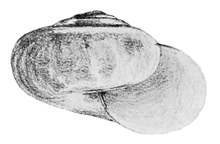Staffordiidae
| Staffordiidae | |
|---|---|

| |
| A drawing of an apertural view of a shell of Staffordia daflaensis | |
| Scientific classification | |
| Domain: | Eukaryota |
| Kingdom: | Animalia |
| Phylum: | Mollusca |
| Class: | Gastropoda |
| Order: | Stylommatophora |
| Suborder: | Helicina |
| Infraorder: | Limacoidei |
| Superfamily: | Trochomorphoidea |
| Family: | Staffordiidae Thiele, 1931[1] |
| Families | |
|
See text | |
Staffordiidae is a family of air-breathing land snails, terrestrial pulmonate gastropod mollusks in the superfamily Trochomorphoidea. [2]
Staffordiidae is the only family in the superfamily Staffordioidea. This family has no subfamilies (according to the taxonomy of the Gastropoda by Bouchet & Rocroi, 2005).
Staffordiidae is a poorly understood[3] family, because it occurs only in the Dafla Hills area of India. The fauna and flora of that area has not been researched sufficiently.[3]
Various sources consider the family Staffordiidae as part of Dyakiidae[4] or Ariophantidae/Dyakiinae.[5]
Distribution
The distribution of the Staffordiidae includes only India in the Dafla Hills.[3]
This area is close to northern margin of the Indian plate.[3] The historical area of origin of the Staffordiidae has not been researched because the coastal area in southern Asia where it is found became uninhabitable[3] after the Indian Plate and Eurasian Plate collided 50 to 55 million years ago. The original ancestral area of limacoid families is thought to be the Palaearctic region and south-eastern Asia.[3] Thus, it has been hypothesized that the Staffordiidae colonized its current area from the southern margin of the Asian part of the Eurasian Plate during the Oligocene period.[3]
Genera
Genera within the family Staffordiidae include:
- Staffordia Godwin-Austen, 1907[6] – type genus of the family
- Staffordia daflaensis (Godwin-Austen)[5]
- Staffordia staffordi Godwin-Austen, 1907[5][6]
- Staffordia toruputuensis Godwin-Austen[5]
The generic name Staffordia is in honor of Brigadier-General Stafford,[who?] who was in command of the punitive force which entered the Dafla Hills for the first time in the winter of 1874–1875.[6]
The foot of Staffordia is pointed.[6] The peripodial margin is simple with a narrow pale margin.[6] There are small right and left shell-lobes.[6]
Reproductive system of Staffordia: the dart-sac is small, globose, with a long cord-like attachment to a coronal gland.[6] The penis is simple.[6] The spermatheca is long.[6]
The radula of Staffordia has aculeate lateral teeth.[6]
Comparison of shells of three Staffordia species:
 |
 |
 |
Cladogram
Staffordiidae is considered a sister group of all other families in the limacoid clade.[3]
The following cladogram shows the phylogenic relationships of this family and superfamily to the other families within the limacoid clade:[3]
| limacoid clade |
| ||||||||||||
References
This article incorporates public domain text from the reference.[6]
- ^ Thiele J. (1931). Handbuch der systematischen Weichtierkunde Fischer, Jena, 1(2): 632.
- ^ a b MolluscaBase eds. (2021). MolluscaBase. Staffordiidae Thiele, 1931. Accessed through: World Register of Marine Species at: http://marinespecies.org/aphia.php?p=taxdetails&id=994727 on 2021-02-22
- ^ a b c d e f g h i Hausdorf B. (2000). "Biogeography of the Limacoidea sensu lato (Gastropoda: Stylommatophora): Vicariance Events and Long-Distance Dispersal". Journal of Biogeography 27(2): 379–390. doi:10.1046/j.1365-2699.2000.00403.x, JSTOR.
- ^ Barker G. M. (2001) Gastropods on Land: Phylogeny, Diversity and Adaptive Morphology. 1–146. In: Barker G. M. (ed.) (2001) The biology of terrestrial molluscs. CABI Publishing, Oxon, UK, cited pages: 139–144. ISBN 0-85199-318-4.
- ^ a b c d Ramakrishna, Dey A. & Mitra S. C. (PDF created 6 April 2010). "Checklist of Indian Land Mollusca" Archived 17 September 2013 at the Wayback Machine. Zoological Survey of India. accessed 30 June 2010. 65 pp.
- ^ a b c d e f g h i j k Godwin-Austen H. H. (1907). Land and freshwater mollusca of India, including South Arabia, Baluchistan, Afghanistan, Kashmir, Nepal, Burma, Pegu, Tenasserim, Malaya Peninsula, Ceylon and other islands of the Indian Ocean; Supplementary to Masers Theobald and Hanley's Conchologica Indica. Taylor and Francis, London. 2: page 184, plate CXIII.
- Bouchet P., Rocroi J.P., Hausdorf B., Kaim A., Kano Y., Nützel A., Parkhaev P., Schrödl M. & Strong E.E. (2017). Revised classification, nomenclator and typification of gastropod and monoplacophoran families. Malacologia. 61(1-2): 1-526
Further reading
- Schileyko A. A. (2003). "Treatise on recent terrestrial pulmonate mollusks. 10. Ariophantidae, Ostracolethaidae, Ryssotidae, Milacidae, Dyakiidae, Staffordiidae, Gastrodontidae, Zonitidae, Daudebardiidae, Parmacellidae". Ruthenica, Supplement 2. 1309–1466.
